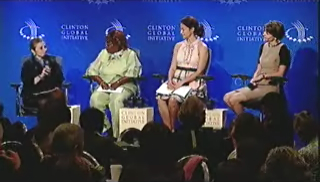In today’s news: the House of Representative held a hearing titled “From Imus to Industry: The Business of Stereotypes and Degrading Images.”
I love hip-hop, yet I see the flaws in some of the music and culture, especially the corporately approved and pushed brand of hip-hop music and culture that dominates the scene. As a queer woman of color, there’s plenty of times when I’m nodding my head or dancing to a good beat only to find myself cringing at some sexist or homophobic lyrics.
But singling out hip-hop for scolding like this in a congressional hearing? Ridiculous. First off, while some hip-hop artists might be particularly direct in voicing their sexism and homophobia through their lyrics, hip-hop is certainly not the only offender when it comes to such things. Pop culture and entertainment is riddled with sexism, homophobia, transphobia and racism. Maybe it’s not as blatant as “the ‘B,’ ‘H’ and ‘N’ words,” as the AP article lists them, but it’s most certainly there. I don’t think I could watch TV for half an hour without seeing at least a few instances of such things, and I don’t think that subtlety or, say, being packaged as cheesy, harmless sitcom jokes makes oppressive imagery any less harmful or negative. Gentler, kinder isms are still isms, and may perhaps do more harm than the blatant stuff because, for most people, it’s totally acceptable, nothing to bat an eye at. Hip-hop though? Apparently a whole congressional session is needed to talk about dynamics that play out in every facet of American culture, just dished out by less convenient whipping boys.
Also – doesn’t Congress have anything better to do than wring their hands over hip-hop? If they’re so concerned about sexism and racism and violence, why are they worrying over symptoms instead of trying to deal with root causes and systemic injustice? Actually, it’s rather shrewd of them to make a big show over things like this while allowing the factors contributing to these larger, systemic problems to continue unhindered. As rapper and producer Levell Crump said during the hearings, “change the situation in [his] neighborhood and maybe [he’ll] get better … If by some stroke of the pen hip-hop was silenced, the issues would still be present in our communities.”
Then there’s the title of and inspiration for the hearing. From the article:
”From Imus to Industry: The business of stereotypes and degrading images” was the title of the hearing, referring to former radio host Don Imus, who lost his job after making derogatory comments about the Rutgers women’s basketball team. The Imus incident has sparked debate within the music industry about black artists using offensive, misogynist and violent language.
This is what’s pissed me off about much of the reaction to the Imus incident. Virulent white asshole says something sexist and racist, and … Black artists come under fire? Folks start hollering for the banning of the n-word in Black communities? What is this, some twisted version of that anti-drugs commercial from the 80s, but this time with white folks saying “I learned it by watching you on BET!” when they spout the same racist and sexist bullshit that white people themselves came up with in the first place? PLEASE. This reminded me of an excellent Democracy Now! interview with Michael Eric Dyson that aired during the Imus brouhaha, during which he was asked to respond to the NAACP’s funeral for the n-word:
I think that there are many more issues that the NAACP should be focused on: structural inequality, social injustice, this war in Iraq, the imperial presidency, which has subverted the democracy of the country… I don’t think Don Imus can blame hip-hop for his problems. First of all, the demonization of black women is much older than Snoop Dogg. This is a history in America that is racist, that sees black women as oversexed, because they had to deal with the oversexed organs of their black men.
Word. It’s just incredibly frustrating to watch Congress spending time on something like this when white culture and the white power structure is riddled with prejudice and discrimination that has done and continues to do far more material damage than hip-hop ever could.
 Yesterday I watched the live video feed of a Global Health working session at the Clinton Global Initiative Annual Meeting. (The press can’t attend the actual working sessions, so we had to sit and watch from the press room.) A bit of background – at the CGI Annual Meetings, government, corporate, and NGO leaders get together to discuss major world issues and figure out ways to tackle them. Each day they break out into working sessions, each one devoted to one of this year’s four focus areas: Poverty Alleviation, Energy and Climate Change, Education, and Global Health. This particular Global Health working session was entitled “Healthy Transitions for Adolescent Girls,” which immediately jumped out at me as a topic of great interest, both personally and for folks at Feministe.
Yesterday I watched the live video feed of a Global Health working session at the Clinton Global Initiative Annual Meeting. (The press can’t attend the actual working sessions, so we had to sit and watch from the press room.) A bit of background – at the CGI Annual Meetings, government, corporate, and NGO leaders get together to discuss major world issues and figure out ways to tackle them. Each day they break out into working sessions, each one devoted to one of this year’s four focus areas: Poverty Alleviation, Energy and Climate Change, Education, and Global Health. This particular Global Health working session was entitled “Healthy Transitions for Adolescent Girls,” which immediately jumped out at me as a topic of great interest, both personally and for folks at Feministe.